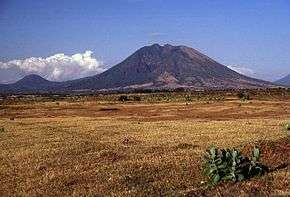Usulután Department
| Usulután | ||
|---|---|---|
| Department | ||
|
Usulután Volcano | ||
| ||
 Location within El Salvador | ||
| Coordinates: 13°22′34″N 88°31′12″W / 13.376°N 88.52°WCoordinates: 13°22′34″N 88°31′12″W / 13.376°N 88.52°W | ||
| Country |
| |
| Created (given current status) | 1865 | |
| Seat | Usulután | |
| Area | ||
| • Total | 2,130.4 km2 (822.6 sq mi) | |
| Area rank | Ranked 1st | |
| Population | ||
| • Total | 366,040 | |
| • Rank | Ranked 5th | |
| • Density | 170/km2 (450/sq mi) | |
| Time zone | CST (UTC−6) | |
| ISO 3166 code | SV-US | |
Usulután from the Nawat language (meaning "city of the ocelots") is a department of El Salvador in the southeast of the country (Lenca region). The capital is Usulután.
It is El Salvador's largest department. It has an area of 2,130 km² and a population of over 366,000.
The department was created on June 22, 1865.
On October 26, 1948, the Alegria district was abolished and a new one called Santiago de Maria was created; it contains the cities of Santiago de Maria, which is the main city, as well as Alegria, Tecapan and California.
The city of Usulutan, the department's capital, was founded by the Lenca tribes but it was conquered by the Pipil tribes. Some of the best beaches in El Salvador are located in Usulutan, and others such as El Espino are now under development. For it's high migration of its residents to the United States it is known as shulton city.
The department is home to Jiquilisco Bay and Port El Triunfo.
Municipalities
- Alegría
- Berlín
- California
- Concepción Batres
- El Triunfo
- Ereguayquín
- Estanzuelas
- Jiquilisco
- Jucuapa
- Jucuarán
- Mercedes Umaña
- Nueva Granada
- Ozatlán
- Puerto El Triunfo
- San Agustín
- San Buenaventura
- San Dionisio
- San Francisco Javier
- Santa Elena
- Santa María
- Santiago de María
- Tecapán
- Usulután

